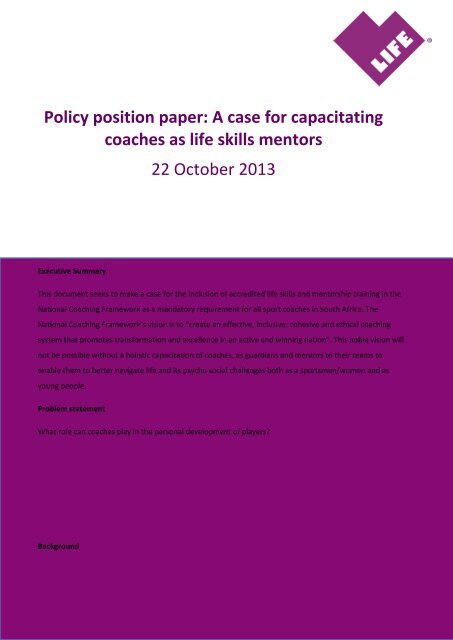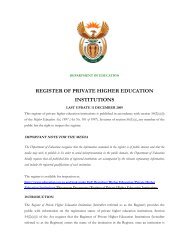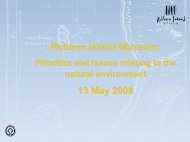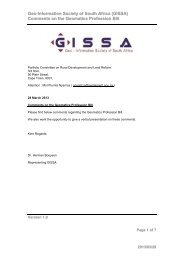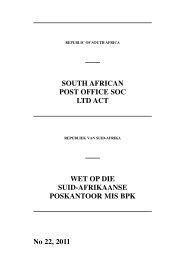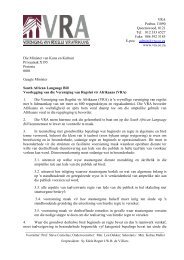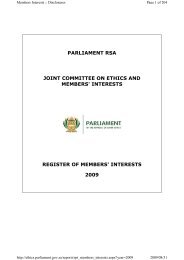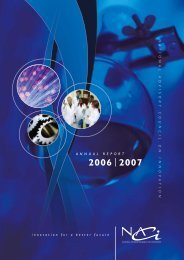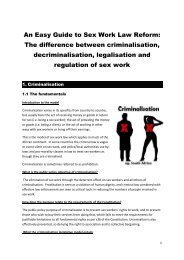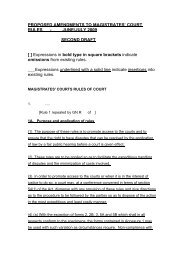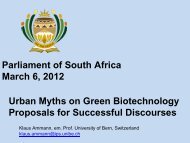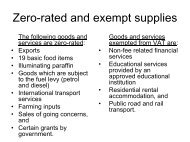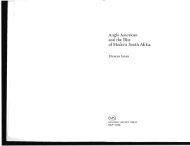Policy position paper: A case for capacitating coaches as life skills ...
Policy position paper: A case for capacitating coaches as life skills ...
Policy position paper: A case for capacitating coaches as life skills ...
Create successful ePaper yourself
Turn your PDF publications into a flip-book with our unique Google optimized e-Paper software.
<strong>Policy</strong> <strong>position</strong> <strong>paper</strong>: A <strong>c<strong>as</strong>e</strong> <strong>for</strong> <strong>capacitating</strong><br />
<strong>coaches</strong> <strong>as</strong> <strong>life</strong> <strong>skills</strong> mentors<br />
22 October 2013<br />
Treating the cause<br />
Executive Summary<br />
This document seeks to make a <strong>c<strong>as</strong>e</strong> <strong>for</strong> the inclusion of accredited <strong>life</strong> <strong>skills</strong> and mentorship training in the<br />
National Coaching Framework <strong>as</strong> a mandatory requirement <strong>for</strong> all sport <strong>coaches</strong> in South Africa. The<br />
National Coaching Framework’s vision is to “create an effective, inclusive, cohesive and ethical coaching<br />
system that promotes trans<strong>for</strong>mation and excellence in an active and winning nation”. This noble vision will<br />
not be possible without a holistic capacitation of <strong>coaches</strong>, <strong>as</strong> guardians and mentors to their teams to<br />
enable them to better navigate <strong>life</strong> and its psycho social challenges both <strong>as</strong> a sportsmen/women and <strong>as</strong><br />
young people.<br />
Problem statement<br />
What role can <strong>coaches</strong> play in the personal development of players?<br />
Background
The aim of the Department of Sport and Recreation is to maximise access, development and excellence at<br />
all levels of participation in sport and recreation to improve social cohesion, nation building and the quality<br />
of <strong>life</strong> of all South Africans.<br />
In this regard, school sport h<strong>as</strong> been identified <strong>as</strong> the foundation <strong>for</strong> m<strong>as</strong>s participation and talent<br />
identification programmes. As a sign of commitment to this initiative, the Ministers of B<strong>as</strong>ic Education and<br />
Sport and Recreation signed a memorandum of understanding in 2011 to ensure that a sustainable<br />
integrated plan <strong>for</strong> school sport is delivered.<br />
The Department of B<strong>as</strong>ic Education’s School Sport <strong>Policy</strong> which is in the process of being adopted will<br />
ensure that learners are provided the opportunity to take part in physical education and organised sport<br />
through the creation of an accessible and implementable school sport system. Empowerment of educators<br />
in code specific coaching, technical officiating, team management and sports administration through the<br />
federations and in line with the SA Coaching Framework will be facilitated by SRSA.<br />
In addition to the above, the SA Sport <strong>for</strong> Change programme, a collaboration between SRSA and the<br />
German Development Bank (KfW) seeks to <strong>position</strong> sport <strong>as</strong> a catalyst <strong>for</strong> change and Youth Development,<br />
using sport <strong>as</strong> a vehicle to promote positive behaviour, attitude and to reduce high risk tolerance to social<br />
pressures impacting youth and society. The project also intends to focus on incre<strong>as</strong>ing "social capital"<br />
through sport and <strong>life</strong> <strong>skills</strong> training, and making a contribution towards prevention of violence in society.<br />
Why is loveLife interested in this?<br />
loveLife promotes healthy, HIV-free living among teenagers in South Africa by addressing the individual,<br />
social and structural factors leading to high risk tolerance. It advocates <strong>for</strong> expanding young people’s access<br />
to choice by developing their sense of identity, purpose and belonging and expanding their social<br />
connectedness. In a recent impact <strong>as</strong>sessment study conducted on loveLife that also explored the<br />
challenges young people face in transition from adolescence to adulthood and the issues impacting on their<br />
<strong>life</strong> choices, early sexual debut and unprotected transactional sex were common risk behaviours among<br />
young South Africans.<br />
loveLife believes that sport provides an opportunity to positively engage young people and to decre<strong>as</strong>e their<br />
risk behaviour by providing physical and mental health rewards <strong>as</strong> well <strong>as</strong> groom them <strong>as</strong> leaders and role<br />
models in their communities.<br />
Page 2 of 5<br />
Insert name of report<br />
Date
Over the p<strong>as</strong>t 10 years loveLife h<strong>as</strong> implemented a games programme to ensure that the majority of youth<br />
in South Africa participate in sports. The programme integrates loveLife programmes on youth leadership,<br />
<strong>life</strong><strong>skills</strong>, sexual health and other HIV prevention programmes into sports, recreational <strong>as</strong> well <strong>as</strong> arts and<br />
culture events. It trains <strong>coaches</strong>, teachers and referees in youth development and mentoring, and is<br />
targeted at young people between 12 and 19 years old. loveLife Games gives young people the opportunity<br />
to benefit from loveLife programmes and find out about the range of loveLife services available to them,<br />
inspiring positive behaviour change among young people.<br />
<strong>Policy</strong> argument<br />
Nineteen years into democracy, South Africa remains the most unequal society with high levels of<br />
unemployment and where the majority of people live in poverty. This is compounded by the quality of<br />
school education <strong>for</strong> most black learners and the high youth unemployment rate. A majority of young<br />
people are disadvantaged by inadequate support from their families, with an incre<strong>as</strong>e in the number of<br />
absent fathers. These structural and socio-economic challenges impact on human development and<br />
hamper attempts to build a more inclusive society. Integrated systemic interventions are continuing to be<br />
implemented by government and its social partners to translate political emancipation into socio-economic<br />
wellbeing <strong>for</strong> all.<br />
Sport is one of the interventions that h<strong>as</strong> been used to deal with these challenges at individual, social and<br />
structural level. It is however important to note that though sport is used <strong>as</strong> a panacea to promote team<br />
work, build social cohesion, promote healthy bodies and minds, it is also a cultural phenomenon, <strong>as</strong> such a<br />
mirror of society and is just <strong>as</strong> complex and contradictory.<br />
In this regard sport can also have negative side effects such <strong>as</strong> violence, corruption, discrimination,<br />
hooliganism, risky sexual behaviours, doping and fraud. To enable sport to unle<strong>as</strong>h its full positive potential,<br />
emph<strong>as</strong>is must be placed on effective mentorship and empowerment of all who <strong>for</strong>m part of the value<br />
chain of sport activities.<br />
The positive potential of sport does not develop automatically. It requires professional and socially<br />
responsible interventions which are tailored to the respective social and cultural context.<br />
The country’s integrated sport development programme that is being implemented by SRSA, DBE, sport<br />
federations and implementing partners requires an enabling environment <strong>for</strong> excellence to thrive across all<br />
Page 3 of 5<br />
Insert name of report<br />
Date
sporting codes, to nature a winning nation. Research h<strong>as</strong> shown that holistic development of a<br />
sportsman/woman throughout the development continuum requires technical, emotional, financial, mental<br />
and physical support from parents/caregivers, the coach and the community. There is a critical need <strong>for</strong> the<br />
parents/caregiver and the coach to create an interdependent bond to be better equipped to provide the<br />
necessary support required by the sportsman/woman.<br />
Importantly is the nature of the <strong>skills</strong> set that the coach should possess in order to be equipped to exercise<br />
his/her responsibilities effectively.<br />
The current National Coaching Framework’s aim is “to provide skilled and qualified <strong>coaches</strong> to support the<br />
development of South Africans at all levels in sport. This will in turn unearth new talent, provide widened<br />
access to sport and further promote South Africa <strong>as</strong> a nation committed to m<strong>as</strong>s participation and sporting<br />
excellence”. The framework further states that “the ultimate objective will be the trans<strong>for</strong>mation of the<br />
South African coaching system, with a skilled volunteer and paid work<strong>for</strong>ce, to meet m<strong>as</strong>s participation,<br />
high per<strong>for</strong>mance and education goals”.<br />
The challenge with the National Coaching Framework’s training framework is exclusion of emph<strong>as</strong>is of the<br />
mentorship role that should be played by the coach in holistic development of the young<br />
sportsman/woman. The requisite <strong>skills</strong> set over and above the technical <strong>skills</strong> should include <strong>life</strong> <strong>skills</strong> and<br />
mentorship to be able to <strong>as</strong>sist the young player in navigating <strong>life</strong>’s challenges.<br />
This initiative will ensure that from school leagues up to national leagues South Africa produces complete<br />
young talent that are resilient, with high levels of aversion towards risky behaviour. This will also lead to<br />
improved psychosocial well-being and physical health of young people through empowerment <strong>for</strong> selfactualization,<br />
whilst promoting <strong>coaches</strong> <strong>as</strong> role models to develop sportsmanship <strong>for</strong> character building and<br />
competitions.<br />
Recommendations<br />
In this regard, this document makes a <strong>c<strong>as</strong>e</strong> <strong>for</strong> the inclusion of <strong>life</strong> <strong>skills</strong> and mentorship <strong>skills</strong> set <strong>as</strong> a<br />
mandatory requirement <strong>for</strong> all <strong>coaches</strong> in South Africa. The <strong>life</strong> <strong>skills</strong> programme will be accredited to<br />
standardise quality and delivery thereof.<br />
Page 4 of 5<br />
Insert name of report<br />
Date
• Key learning are<strong>as</strong>:<br />
o Strengthening knowledge of HIV, around young people’s risk behaviours and in the field<br />
of HIV prevention<br />
o Improving interpersonal communication <strong>skills</strong><br />
o Strengthening capacity to impart <strong>life</strong>-<strong>skills</strong> and leadership <strong>skills</strong><br />
o Enabling participants to engage the families of young people and their communities<br />
• Expected outcomes:<br />
o<br />
o<br />
o<br />
o<br />
o<br />
o<br />
o<br />
o<br />
Young people have a greater sense of identity, belonging and purpose<br />
Young people have a healthy self-esteem and self -confidence<br />
Young people are socially more connected and experience greater social inclusion in their<br />
communities<br />
Young people’s health h<strong>as</strong> improved<br />
Young people decre<strong>as</strong>e their sexual risk behaviour<br />
Young people know what it means to work in a team, display discipline and commitment<br />
Young people value sport and exercise in their <strong>life</strong> and strive <strong>for</strong> sporting excellence<br />
Young people value their engagement with adults and see them <strong>as</strong> guides and mentors in<br />
their lives<br />
Conclusion<br />
A <strong>life</strong> <strong>skills</strong> and mentorship programme is b<strong>as</strong>ed on the firm belief that equipping <strong>coaches</strong> and sportsmen<br />
with <strong>life</strong> <strong>skills</strong> to develop young talent will empower them by building their self-esteem, sense of belonging<br />
and identity, whilst incre<strong>as</strong>ing their aversion <strong>for</strong> risky behaviour. This is envisaged to contribute towards<br />
nurturing of a new generation of responsible, conscious and dedicated sportsmen in South Africa.<br />
Sources consulted<br />
South African Coaching Framework, 2010-2018; Sport and Recreation South Africa Strategic Plan 2012-2016;<br />
Think Sport Volume 2; http://www.un.org/wcm/content/site/sport/home/sport<br />
Page 5 of 5<br />
Insert name of report<br />
Date


